Belgium - Australia on an BMW R1100 GS motorcycle, solo.
Report #17 (part one) - December 16th, 1998 to January 26th, 1999...
Picking up where we left off
Christmas has gone by way too fast - as usual. I was in Bangkok way before Carolyn and I were up to it. Leaving Sunday night from San Francisco, and arriving Monday afternoon in Bangkok (via Taipei, Taiwan). Flying is a very tedious business, but only after you have arrived you appreciate the speed at which this goes. And more so after having traveled a comparable distance over land myself. Upon entering the country I get a new stamp in my passport - I can stay until February 3.
With the acquired stamp and my import document for the bike I go to the customs office, they are open for another hour. They recognize me, and the extension is taken care of by an employee while I have some coffee with the chief in her air conditioned room (apparently I got used again to being in the 'cold', I'm sweating like a pig in this heat).
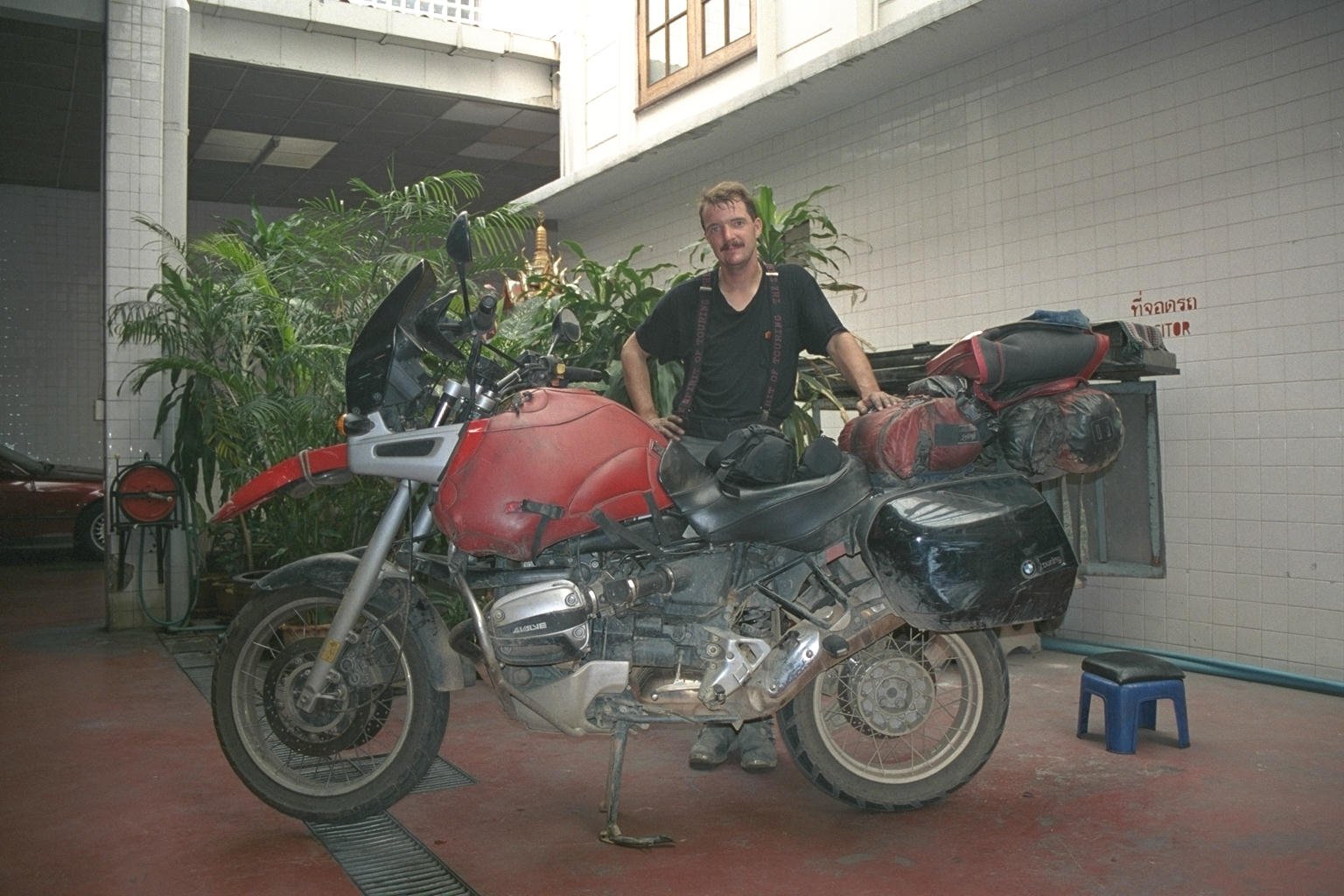
One day too early (it's January 5) I arrive at the BMW dealer. He hasn't finished working on my bike, but that's not because I'm early. They are unable to tune it correctly, and indeed the engine isn't running smoothly. Everything else is done. We go over the checklist: the usual periodic overhaul, the differential, the bearings holding the cardan axle in place, a new case support, the clutch lever and all of the front suspension. Apparently he has forgotten I also wanted a new battery (after the smoking cables in Islamabad), and we use one that we 'steal' from a broken down K100. We agree I'll return in four weeks to get a new battery, he'll fill it up and charge it.
We hook up the BMW device for tuning the bike, and the engineer shows me the problem. Sometimes the injectors are synchronized, and the next moment they are completely out of sync. The carbon monoxide control seems to be out of order all together - there is a constant overdosis of C)-gas in the exhaust fumes. For a while we look at it, and then I decide to do something: I disconnect one of the inlets. The problem is clear right away: there is some black stuff on the valves, all of the inlet is covered with goo. The holes to perform the tuning are almost clogged up. After some cleaning we're ready to tune the engine. The CO level is a bit high, but that's probably caused by this filth on the valves in the engine itself. The engineer shows me a plastic bag with the results of cleaning the gas filter: whole bugs have found their way into the innards of my gas tank...
I pay the (steep) bill, and all excited I'm on my way - into Bangkok, to the hotel. The front whell, which I have inspected from all sides, doesn't feel 100%, but I can't seem to find the problem. At least the wheels are in line now, and the bike rides in a straight line. Maybe it's just that I got used to riding a crooked bike. I spend the afternoon sleeping, although that isn't improving my jet lag of course. But time is on my side, and I don't feel like teasing myself with exhaustion. The remainder of the (working) days in this week are spent lazily - I even stay in bed for one whole day, I'm reading the latest Grisham.
They day I do get out of bed is a disappointment: I want to take care of the visa for Laos, Vietnam and Cambodia. I start off with Cambodia. They tell me I can get a visum for myself, but entrance for my bike is out of the question. A series of check questions ("How can I do this anyway?", "What if I try in Vietnam?", and "Can I speak to the consul?") leaves me with a disconnected phone line. Vietnam refuses to discuss this over the phone. I have to stop by. When I do this, they tell me they cannot make a decision. But if I pay them 60 dollar, they'll check this with Hanoi. I ask them if then either I get permission, or I get my money back. No guarantees, but also no money back. I think these employees want to earn some extra money. I forget about Laos, it's in a remote corner of Bangkok. I decide to leave it at this - I've had my share of poor countries in India. For now I appreciate the excellent Thai infrastructure, and I don't crave for bad roads and corruption.
The North
On Saturday I go to the northern parts of Thailand. I reach Lampang using excellent roads. Others had warned me to look out for truck drivers with Indian habits, but I haven't seen those. Most of them even make way without any honking on my part - they use their mirrors! And all the brake lights of the cars are working - that's great, now I get to ride with my ear protectors again. In India I didn't use them, so I could hear the trucks brake (to make up for the missing brake lights). Almost all of the roads have four lanes, but (luckily) there isn't any toll. I get to use them all. The trip goes speedily - I do have to get used to covering several hundreds of miles in one day. Ever since Iran, but especially in India, two hundred miles took up more than a day.
The scenery is somewhat dreary - they grow lots of rice here. Every now and then a piece of land is planted more densely, but this is not nearly the jungle I expected. Everywhere there are rivers, canals and puddles which sport all sorts of plants. More than once I see Thai up to their waists in the brown water, waiting for a fish to get trapped in the nets they are holding. A lot of the rice fields are barren and dry - they've just harvested the last crops. In a lot of places they dry the rice on the paths alongside the through road. The people working the fields wear those typical straw hats we all know from those Asian pictures.
I stop in Lampang, I noticed I have to cross a hill rangeto reach Chiang Mai. And I also saw a sign: "Lampang Nature Resort", and I realise I don't feel like winding up in another city. The resort has been beautifully built, and it is very quiet. The room is pricy, but after studying my license plate and answering the usual questions I get the room for half price. The hotel manager is impressed. Later on I learn this hotel is on the route of a large amount of 'package' tourists: two coach loads of Swiss and German tourists are dumped, and I join the buffet they've prepared for them. The manager 'forgets' to ask me to pay for this food, and for the rest of the evening I get to enjoy her personal attention.
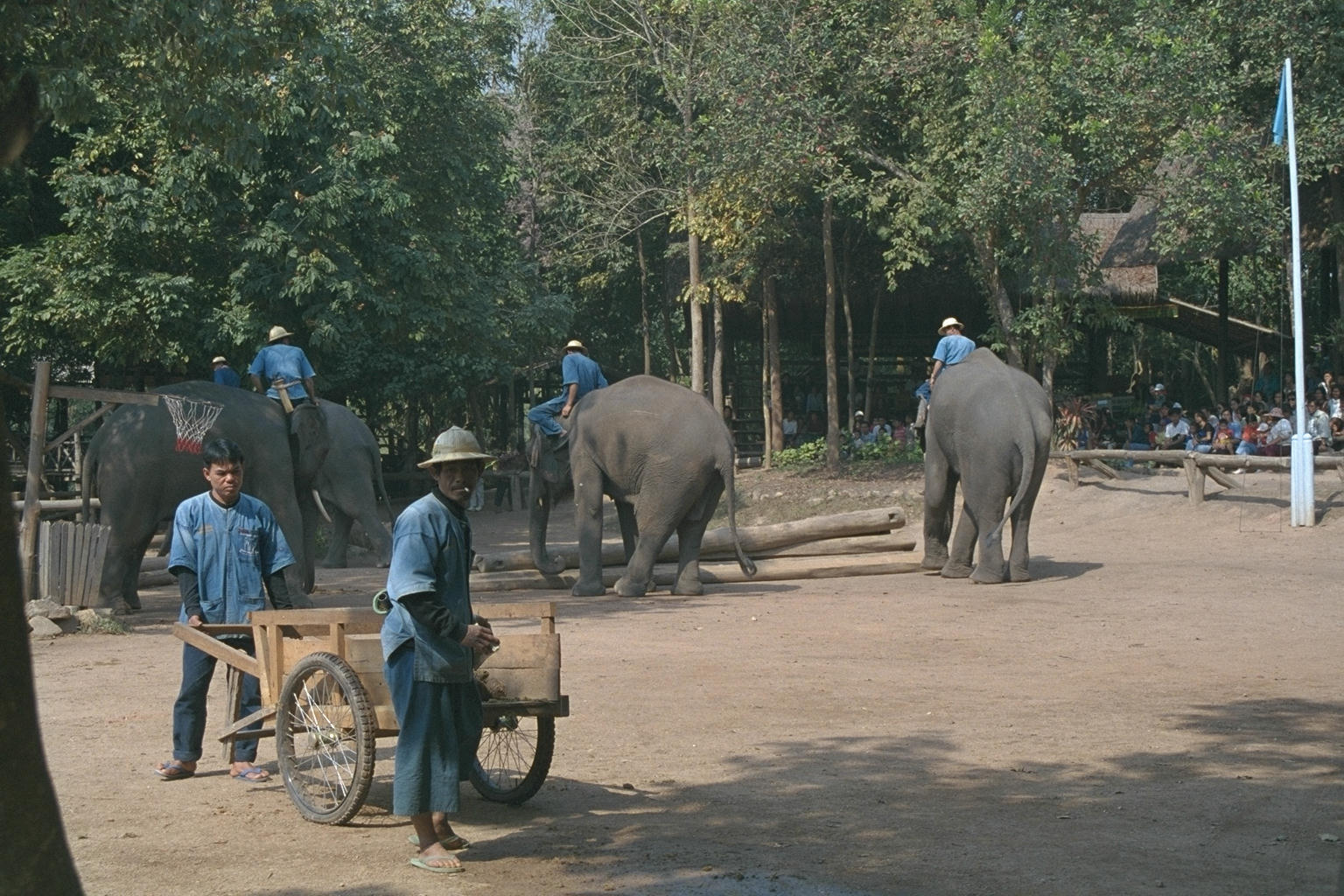
The next morning (it's Sunday) I stop at an elephant's school. These friendly animals are used here to carry the chopped down trees out of the jungle. In this school they are trained, but they are also used as entertaiment. Many Thai tourists (with a lot of children) and me are spectators to the tricks of the elephants. The best part is where, in between acts, the audience gets to approach these soft tempered giants. I engage in a bamboo tugging contest with an elephant, he is laughing because he is much stronger. He doesn't even pause eating while I experience up close the power in one of those sensitive snouts.
Chiang Mai is cluttered with guest houses. However, I fail to find a place which would cushion the switch from the more luxurious hotels. I settle in a hotel where they park the bike in an open square inside. I still haven't got rid of the jet lag, and the next day is spent sleeping and writing my travel report. I eat at an unsightly shack run by a family: I eat chicken and ginger. This will quickly become one of my favourite meals.
The problem with the food is I haven't got the faintest idea what I'm eating. I've seen most of the vegetables, but I don't know their names, nor where I could buy then in Europe. They only use fresh citronella grass and gember - the powder versions I use at home are 'forbidden' here. With the right ingredients it all seems very simple: a second very tasty dish is called Tom Yam. It is a soup, served in a bowl with a chimney. The bowl is round, and in the center there is a hole with a pipe to keep the coal fire in the bottom going. Tom Yam comes in many varieties, with chicken, pork meat, but also sea fruit. Half a crab, very large and small shrimps, clams and squid are tossed almost carelessly in water, together with ginger, (lots of) citronella grass and some onions. You just wait a while, and presto, a very nice meal.
I'm not the only one with eating problems: the farangs cannot handle the spicy food. (The Thai call foreigners 'Farang'. It is not a bad name, merely a distinction. Of course they pronounce it like a real Asian: 'faLang'...) Many farangs don't eat their meals because it's too spicy for them, and the brave complain about upset bowels. Luckily I'm seasoned by the Indonesian cooking skills of my mother.
Sick
I've planned to visit the golden triangle on Tuesday January 12. The evening before I go out to get myself something to eat. But it is still early, and in one of the pubs I meet some peolpe I've seen before. It is happy hour, and it's warm... After a few hours we finally start eating - the group has changed a bit. The newcomers buy another round of beer and we order our meals. I stick to a simple Khao Pat (fried rice, like Indonesian nasi) with shrimps. They serve this in all of Thailand, with cucumber and half a lemon.
We're sitting outside (everything here happens in the open, alongside the streets). A dirty, little girl approaches me - she wants money. "For food", she says. In her hand she holds a piece of dried fish. "Eat from the Khao Pat", I offer her. She refuses, except for the cucumber, she does eat that. I ask her what she has in her hand, and she shares some of the dried fish. It doesn't taste great, but at least I tried.
A Tuk-Tuk approaches, hoping to pick up a 'freight'. The driver gets out and I take his place. I ask him how to start the two stroke engine, and how to steer this cross between car and motor bike. It has a clutch and brake pedal, a stick shift (between the legs of the driver), but it has a steer like a bike, with the throttle attached. I start, and before my slightly clowded mind realizes it I'm driving someone else's Tuk-Tuk in a foreign city, driving at the left side of the road. I make a small tour: this machine can make a fast turn, but it tends to topple quickly. Without problems I return the vehicle, but the owner has started drinking whisky with the other drivers. But he isn't drunk enough to not charge me for the ride...
The beer comes in 650ml bottles. And because I always drink the local stuff, tonight it's Chang (elephant) night. Thailand has two local breweries: Singha and Chang. They have licenses to brew Heiniken (is there any place in the world where they don't have Heiniken?), Carlsberg and Kloster (a German brand). The Chang beer turns out to be a bit stronger than all others: almost as strong as a Duvel. But for the main part I'm having fun and I'm even more thirsty...
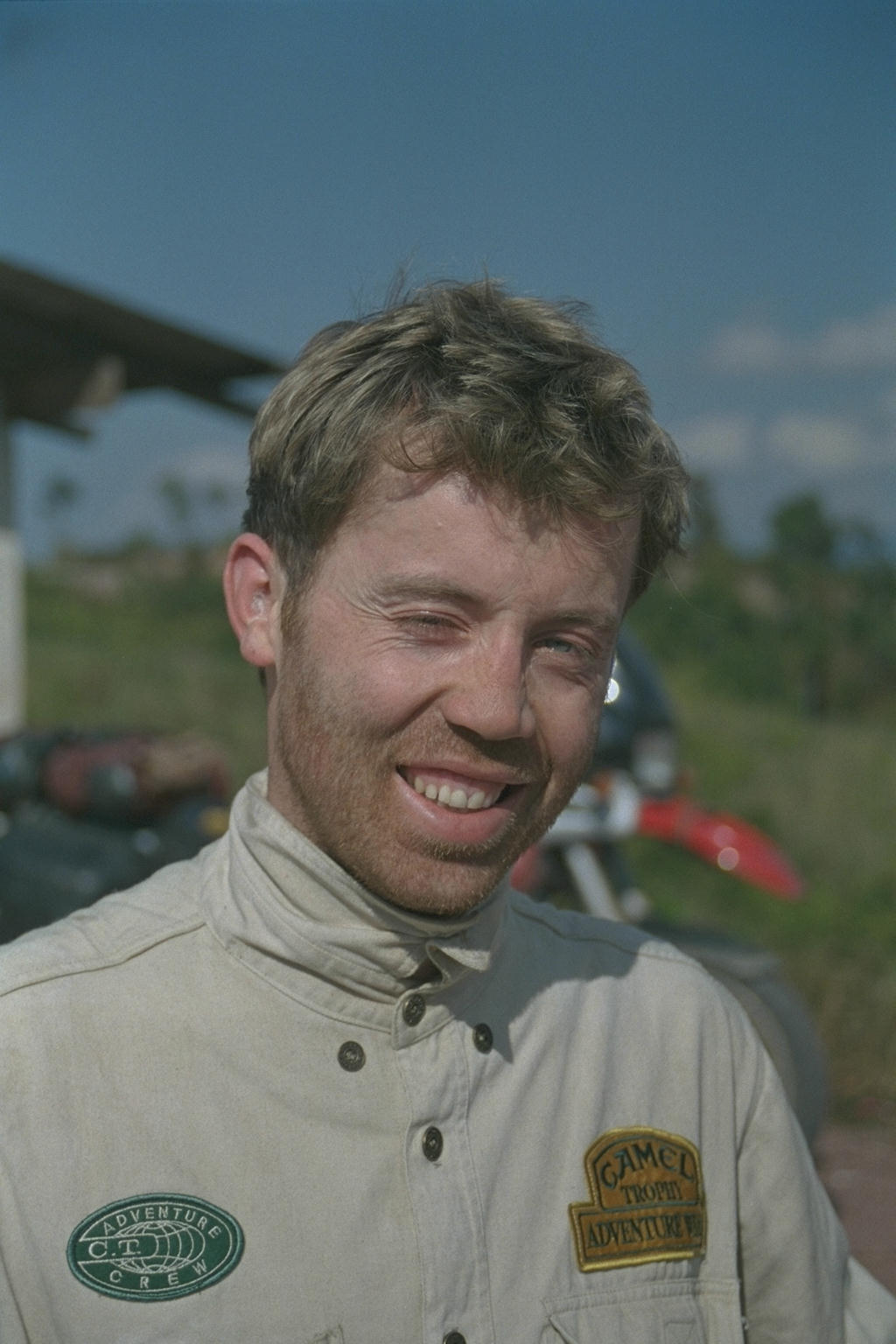
A German joins us, and we order another. His name is Martin, he says he is riding a bike nearby. Tomorrow he'll go up north, to the golden triangel. A plan is quickly drawn, although Martin has a slightly different daily rythm: we'll depart at 10 AM. And that's very late by my standards, but the prospect of riding together with a man who makes the forest parts of Germany unsafe on his 900cc Kawasaki is very attractive. He has rented a 250cc off-road bike.
At night I get ill. It could be the small piece of fish, although to be honest I suspect the amount of beer has something to do with it. Anyway, Martin is very disappointed when I tell him my body resembles a wet towel this morning. I decide to skip this ride. We check out each other's bike, and Martin adds that the 250cc bike is a happier bike, because it's master doesn't drink so much. The 250cc will ride today, the 1100cc will have to wait patiently until tomorrow. For the larger part of the day I remain in bed. And Chang beer is crossed off my diet.
Going to Laos or not?
The next day I'm OK again, and I'm ready to hit the road at 8 AM. I follow the roads on my map northbound. Apparently every road has been widened since they drew this map, or at least the roads have been repaved. It is a beautiful road, and I have plenty opportunities to look around me. The more I close in on Myanmar (formerly called Birma, the locals still call it by that name) the hillier the terrain gets. And on hills it is more difficult to grow rice - nature has kept it's foothold here more firmly than elsewhere. Large trees and bamboo define the scenery. I notice the trunks of the trees aren't visible. Right beside the road there is this low-growing stuff, and this gradually changes into bamboo or climbing plants, and beyond that are the trees. It looks pretty unpenetratable: the view from the road resembles a wall of leaves.
In the more flatten parts of the landscape they do grow rice, and there are the small villages. I order a lunch in a straw shack somewhere in the middle of nowhere. While I wait for the Tom Yam to arrive, I try my cell phone. And it is working - it almost had to be, judging by the large amount of red and white poles. I've never seen a cell phone network so dense as this one. And even a data call to Belgium poses no problems. Internetting from within a straw cabin - in a weird way Thailand has become stuck between a developing country and a developed country, and the economical crisis will keep this situation for now.
In Thailand it is customary to greet one another with a smile. It is a very small effort, but it makes communicating with others so much nicer! And the Thai in the north go even further than that: the smile widens when you return it likewise. They seem sincerely pleased about the visit of a stranger. The hospitality is enormous, although some of the Thai can't help but stare at you, they aren't used to farangs. But I got used to the staring long ago, it doesn't bother me. In short, I'm thoroughly enjoying myself - without a doubt Thailand is my favourite country.
A road of good quality is nice, but it is hardly a challenge. So I take the next exit and I start a small exploration. In no time I'm at 5,000 feet, the temperature has dropped to 23 degrees Celsius. A special experience after so much heat in the past weeks. It's a pity the road ends and I have to return. I continue my trip northbound, towards the border with Birma, the place where I had planned to enter Thailand, if that country had let me in. Of course the border itself isn't very exciting, and so I quickly ride towards the Mekong river. Now I have more success on the small roads: for hours I follow the river on the Thai side, looking at Laos on the other side.
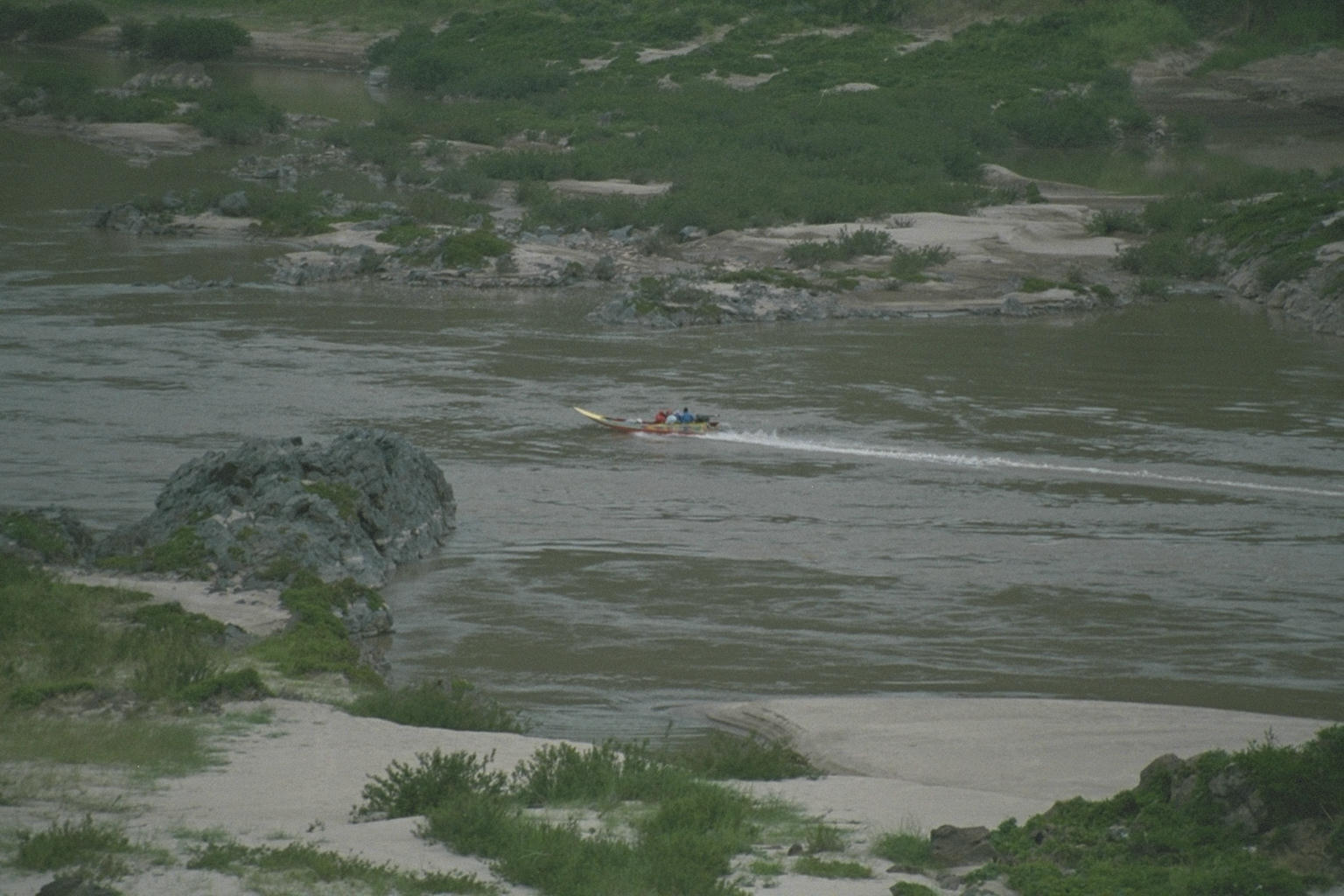
Every now and then a 'long-boat', filled with passengers, passes by with lots of noise. A long-boat is a long, wooden boat with a large engine on the back of it. The engine powers a large axle that sticks in the water. In itself nothing new, but these engines are put on the boat using some sort of ball bearing, they are kept in place by the driver. They steer the boat by turning the whole engine. So a rudder is absent. There are engines that are specially built for this purpose, but the real eye cathcers are the 'home grown' machines. I spot a few six cylinder engines without exhausts pushing a boat at high speeds over the large river.
Meanwhile I've seen so much of Laos I want to go there. I settle down in Chiang Khong. Here they supply visa, and there is a border crossing. I find shelter in a guest house, situated in a traditional Thai building. On poles, all made of tropical wood. The floors are supported in the middle and at both sides. But the wood is flexible, walking on these floors makes the whole house vibrate. I fear for my night rest, this guest house has a lot of small rooms, all on these same floors. I meet two Dutch people staying here. We spend the evening talking about our world trips. Tomorrow they'll receive their visum for Laos, and they will cross the Mekong right away.
I've found out that getting a visum for myself is no problem, but that importing vehicles is cause for earning extra money. They ask 100 dollar for the crossing and the paper work at the border. "I can handle the paper work, how much for just the crossing?" Still 100 dollar. First I go on foot to the shore to see how they will transport me to the other side. I suspect they will use a long-boat, and I'll be out of luck if my bike topples into the river. There is a rusty old ferry boat, but all people are crossing with the long-boat. I ask someone if the ferry is in operation, and I get an answer that could be anything between "yes", "maybe" and "no".
I spot a 2500cc bike. It's Martin's - he is having a lunch. Again I exercise the fact that I'm on a world trip and that I can do whatever I want: we'll make a ride together this same afternoon. Martin is very pleased to see me again - I think traveling alone doesn't become him well. For a while we follow the Mekong river, and then we turn southwards. We select a small road (Martin has a very good map) which will take us through mountains and a few villages.
Freedom of religion
For me, this is where the real Thailand starts. Maybe I should say: the old Thailand. In the countryside time has come to a stop. All people live in those traditional houses on poles. Water to drink or for washing is in large clay pots next to the houses. Naked children are playing in the dusty streets. The village people are staring at us, like we are the first farangs on bikes. They grow some rice, some people harvest the plumes of the straw which grows everywhere. The nature is virtually untouched: all sorts of plants are mixed here. The diversity is much larger than I've seen before in other pieces of jungle. And again nature has covered every spot with something green. There are no electricity poles, and I don't think every house has a generator under it. What a contrast: eating hamburgers at an American franchise in Bangkok, and then doing some semi off-road through this area!
We continue for another two hours, until we reach the center of the flat land that dominates the northern part of Thailand. We end up in a city which is apparently barren of tourists. We rent two rooms in the most expensive hotel in town. For our 150 Bath (4 US dollar) we get an authentic Thai room: a bed with just a sheet and a blanket which is reused by every visitor without washing, a bathroom without warm water, a toilet without paper but with a hand held shower and a ventilator on the ceiling. I ask for some more sheets and a towel for each. The city lies next to a lake, and we decide to dine at the shore. We select the busiest restaurant and we're not disappointed: Martin first tries something Thai, but then falls for the grilled chicken.
By then it is about bedtime for me, but Martin proposes to visit a club. Surprisingly we succeed. A transsexual is showing off on a stage, while he/she is producing deafening music. Slowly this joint is filling up, and when things are on a roll we decide we have had enough noise and we walk back through dark Phayao.
We discover we haven't planned this trip very well. Martin has to return in Chiang Mai by tomorrow, and that is not so far anymore. We only have to cross the remainder of the flat area. There is only a small ridge of hills on our way, but that's it. We start off early, and at 8:30 AM we're at the top of the ridge eating grilled chicken for breakfast. When you travel like this, you get less and less picky when it comes to what meals to eat at what time. You just eat what is available.
Before noon we arrive in Chiang Mai, and we use the time to visit a very large Wat. A Wat is a Buddhistic temple - west of Chiang Mai is Wat Doi Suthep. It is a large temple with an excellent view over Chiang Mai. And because we haven't got much time we have to keep a good pace over the hairpin curves climbing the mountain. We slide by all those mini vans filled with farangs. I can see by the style Martin rides he has a Kawa back home with tyres that'll wear off at the sides. The poor 250cc bike has to work hard. The Bayern power house of mine has a great time as well - finally some coloring the road with my tyres after all this softy stuff. At the summit we park the bikes with the other mopeds and we start ascending the stairs to the Wat.
I'm rather impressed by Buddhism. This is the first time I see a (succesful) religion functioning without a church hierarchy. A Buddhist is seeking for Nirvana without the aid of spiritual leaders telling him what to do and what not. My problem with most religions is that there is always a reverend, priest, imam, guru or other spiritual one deciding everything for the others. All too often I see some imam calling out to start a Jihad over some piece of land which hasn't got anything to do with religion, but with power. Or I hear those militant Irish reverends stating that Catholics should be wiped out. A mix of worldly and religious power won't happen easily in Buddhism. And I like that.
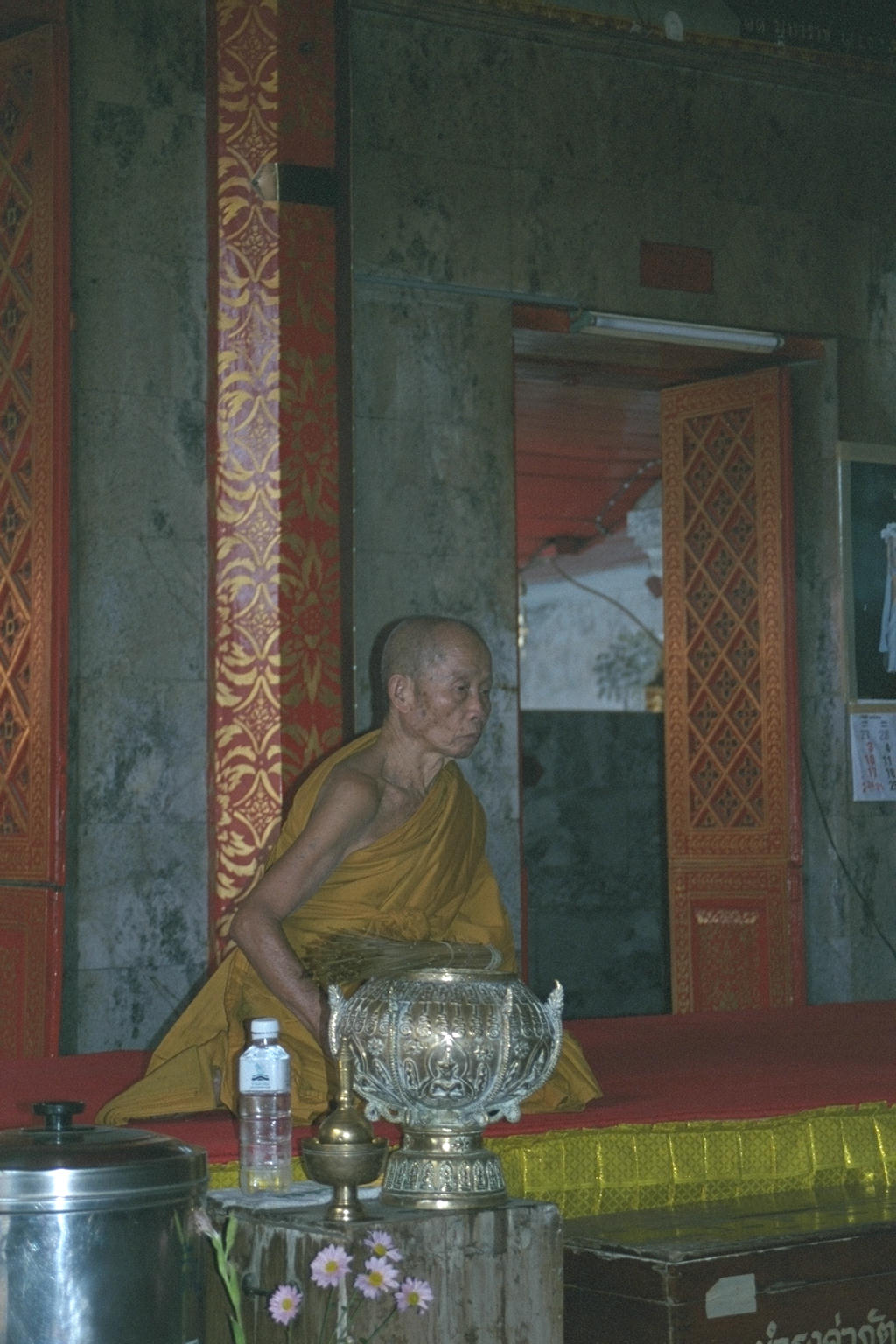
The fat golden man is present as well. Next to the statue is a monk - he is the one you can ask blessings. I have read you have to take off your shoes, and you have to have your feet pointing away when in the presence of the Buddha. And you have to kneel down. For this they have placed a thick rug - the Thai first kneel down and then shuffle forwards. They carry a lotus flower and two sticks of incense between their hands with which they make a 'wai'. For this you make a praying gesture, your opened hands pressed together, and your index fingers raised to the level of your nose. You nod and you close your eyes. The flower and incense then are put in a kind of rack.
Everybody is barefooted (or on his socks), they don't allow you in wearing shoes. Like in the Taj Mahal my gigantic motor boots are set aside, they don't fit in the regular shoe compartments. Inside there is a sign (in English) with a request to only take pictures of the Buddha while seated. When all the Thai people have left, I retreat to a corner of the rug to take in the scenery. A couple of English tourists enter.
They don't kneel down, but walk straight passed the monk and the central place with the rack. They pull out their cameras and start shooting. I bite my lower lip - if someone would desacrate the altar in the Anglican church, they would have noticed. The monk doesn't even twitch. He does notice it all, but stays quiet. Maybe he is already used to this kind of ignorance. I wait what will happen. Maybe the monk thinks the visitors must decide for themselves. The tourists leave.
A couple of young Thai enter. They make a wai to the Buddha, and then address the monk. They want a blessing. And then the monk does something special: just before he sticks some kind of small broom of straw in a bowl of sacred water, he signals me to come closer. He exchanges a couple of words with the Thai men, murmles something and sprinkles water on us. And so I am blessed by a Thai monk, and it touches me.
Some more tyre rubbing
Now that we've tasted it we had to eat some more. In a crazy, unwise but fun plan we decide to just go to the highest point of Thailand. This is some 70 miles from Chiang Mai, but due to some miscalculation on our part we think we'll reach it after 40 miles. So we are a bit short of time, but there is a solution to that: racing. And again we ascend the mountain with an acceptable speed. This time we reach an altitude of 8,000 feet, and here it is a mere 16 degrees Celsius... There was not much to see: a grave of (I think) the fifth king of Thailand opposite a communications tower from which it is absolutely forbidden to take pictures of.
Upon returning to Chiang Mai Martin notices his tyre, which was new when he rented the bike, could use a replacement. All worn out he says goodbye - tomorrow he returns to freiburg, Germany. I decide to return to the same hotel - all guest houses are full or are too dirty.
Jungle
The next evening (it's Saturday) I take a stroll along the stools near the market in the center of Chiang Mai. Opposite a bar with many travelers there is a cart with grilled chicken. And Lieve from Belgium (I met her in Iran) is buying some chicken! What a coincidence! Iran is many, many miles and four months behind us, and still we run into each other. Peter is in the bar, with two other people. We decide to eat together, and we talk all evening long about our experiences - it gets very late.
Leaving the next day is out of the question: in the afternoon I go to a small village near the border of Birma, this time more to the west. After arriving in Pai I see that many farangs rent a small bike and ride the so-called Mae Hong Son route. The village is packed with guest houses and the kind of tourist who travels alone, but is just a bit short of being a world traveler. Of course I generalize here, but the specimen of some 20 years that comes to me bragging about his South Asia study and his three months stay in Thailand takes the biscuit. He doesn't speak Thai or any of the other local languages, he hasn't been in Laos, Vietnam or Cambodia, and he talks all kinds of rubbish which sounds worldly. The others agree with every statement he makes (or don't try to contradict him). Fortunately an enormous downpour of rain frees me of the group of floating youngsters.
I would like to see more of the 'authentic' Thailand, and so the next morning I ride from Pai into the jungle. In Chiang Mai I bought the same map Martin had, and now I know I'll spend this day riding off-road. Even the non-paved roads in Thailand are very accessible. The road is nice and flat, made of small gravel which is packed with heavy machinery. There are water channels to prevent the rain from removing the top layer of these roads.
After an hour and a half of riding through the jungle the sky darkens. When they talk about rain over here, they don't mean those small drops. A curtain of water falls on me, and before I have a chance of getting off my bike I feel the water enter my underwear. I wait until it is over, and I get even wetter. The fun part is this is not at all unpleasant. Sure, you get wet, but you don't get cold. It is raining warm water.
Thanks to the same map I know that the road will narrow after a small village called Wat Chan (there is a temple and a monestery, hence 'Wat'). I'll get into very rugged mountain terrain. I briefly contemplate returning because of the rain, but then the sun starts to shine again, and everything dries up in no time. In Wat Chan it is time for some breakfast/lunch. I order the usual breakfast, a bowl of noodle soup at a stool in the center of the village. Everyone, including the monks, stop to admire the size of my bike. After a while an English teacher emerges, and some moments later I stand in front of a classroom with shy kids.
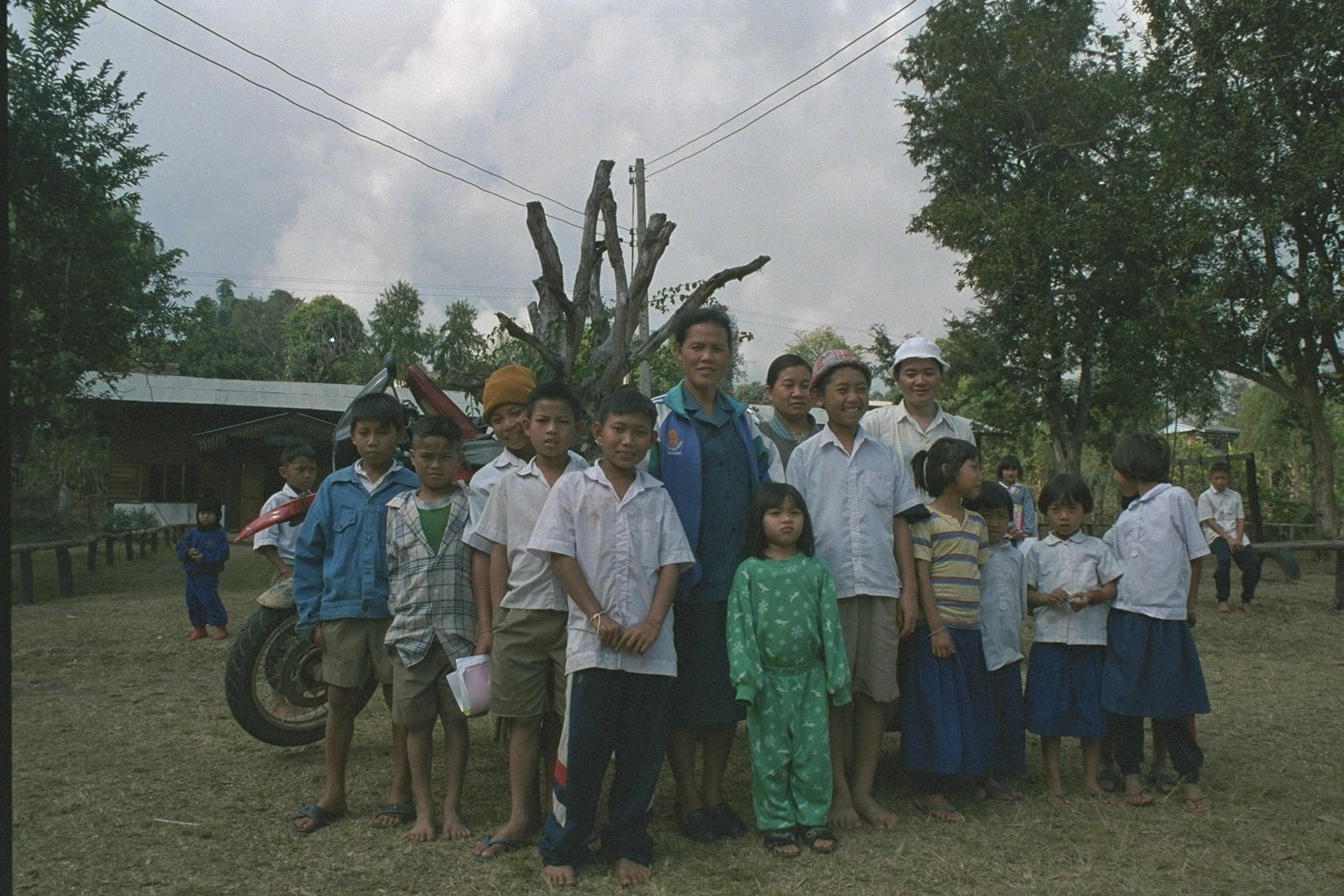
The people are mainly members of the Karen tribe, or so the teacher tells me. And that minority, with its roots here between Thailand and Birma, is heavily discriminated. The school which I visit doesn't receive any money. The chief of the village has been murdered last year, the police is said to protect the killers. A few months ago they distribute free food amongst the people, after which a few hundred of them wound up in hospital with food poisoning. Forty of them died. I am astounded hearing so much sorrow which I didn't know. To be honest I'm not sure about the motives of the teacher, she tells me these stories without any encouragement. I expect a question to donate some money to the school, but it doesn't come.
Just after I've left Wat Chan it is indeed over with the nice piste. I ride over paths through the jungle, and often I have to duck to prevent a collision of my helmet and the flora. This is the most beautiful part of Thailand yet. The forrest is in its original form, because the terrain is difficult to access. The Karen tribe lives of the sale of wood and some farming. They try hard to keep the people from growing opium. This could be the reason for those violent stories.
In general, the paths are dry, but they do show traces of heavy rain. In some places the water has carved deep tracks, and I ride over 30 centimeter wide sand between these 'rivers' which have dried up. The soil is red and clay-like. Sometimes I overtake mopeds which are being pushed up a hill. The terrain is very steep, but I don't mind: my bike is perfectly tuned, and the quality of the gas is excellent. No danger of repeating the accident in Jordan, where I plummeted 6 feet down with bike and all. The descends are a bit tougher, but with all the experience from Pakistan I'm doing fine. I concentrate on the surroundings - it thrills me to ride here all by my own.
But it is just a bit too good to be true: after a summit of 6,000 feet I enter a valley where it has rained this morning. The path is muddy, and I have to descend over a one foot wide track. No problems for quite a while, but then I have to brake for a curve in the road. The bike slips off the ledge, and in a reflex I stick out my leg to catch the fasll. I estimate the overall weight of me, the bike and the luggage at some 400 kilos. And this is too much for my knee. When I try to get up, I feel a stabbing pain in my knee. Luckily the left case only came loose without further damage.
I wait for 5 minutes, and by then I'm able to stand again. But it is more important for me to be able to change gears with the foot attached to the damaged knee. In a good spirit I continue, thinking I was lucky because the knee doesn't get thick and doesn't hurt while riding. I continue for some two hours until I exchange the wilderness for solid roads again, to Mae Hong Son. I can only sleep when I put my knee on a pillow. Every move wakes me, and the nightly walk to the toilet is sheer torture. I stay in bed all day long, with my leg raised. The guest wifes spoil me to death out of pity for my pain-stricken face when I try to move.
On Wednesday January 20 I think I'm OK again, and I leave for the next tribe: the Long-necks. These people, from Birma but fled to this border area in Thailand, wear copper rings around their necks. Not just a few, but right up to their chin. And every three year they add another ring, which stretches their neck. Actually it pushes down their shoulders and collar bones, but the effect is that these people appear to have long necks. They wouldn't survive a removal of the rings, their neck muscles aren't used to carry the weight of their head.
The road to the village, which almost all tourists pay a visit, is partly unpaved. There is even a deep river passing, which can be taken by four wheel drives without trouble. The village is a tourist trap. The people returning are almost all disappointed, and call it a human zoo. I decide not to go, partly because I have to walk a bit. And during the ride my I had to make a few strange moves - my knee is grateful we are going back.
Thursday January 21 I again cross the mountain ridge, again using a piste. But people are very busy laying fresh asphalt, and most of the way it's a breeze. Again I pass Doi Inthanon (the highest point in Thailand) and now I take some time to check out the Wat at 6,000 feet altitude. There are lots of coach tourists, they are amazed that one can actually travel on bike from Europe to Thailand. I even meet a few Dutch people who visit this country for the tenth (!) time. I spend the night in Chiang Mai.
Charity
Before I went to California last December, I met Bill Hall in the hotel in Bangkok. He has an Apple Powerbook laptop on which he writes his stories. Then he sends these stories to a couple of people interested in his adventures, much like I do. But Bill has to do everything twice, there isn't a way to let his Apple work together with the Windows PCs at a cyber cafe. I've spent an hour fiddling on his machine and on the homepage of Apple to figure out how to get it to write DOS floppies. At least those two weeks we at Dupaco used an Apple was worth something after all. The same puzzle had to be solved on that machine.
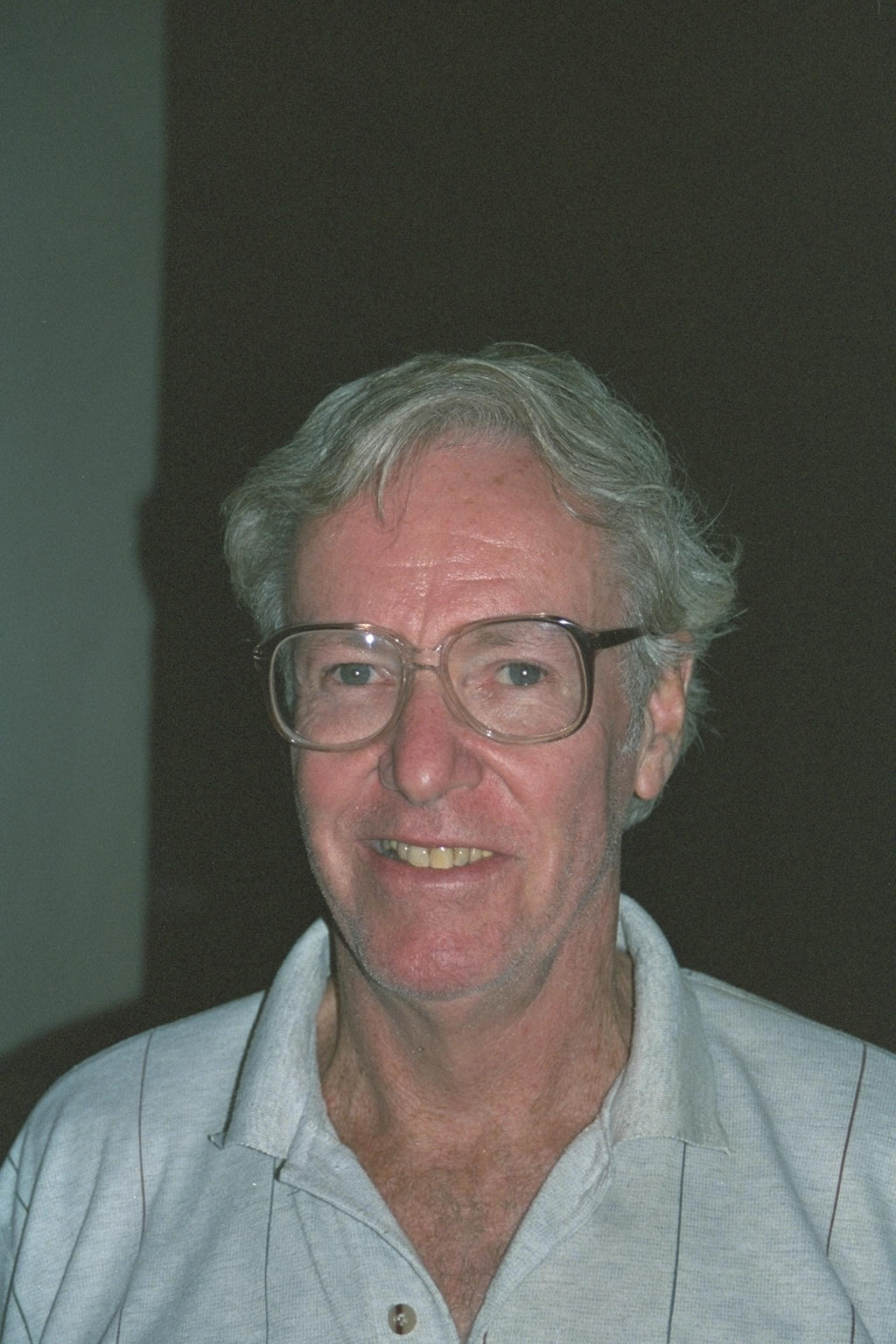
Bill told me what makes him travel these distances: he is an English teacher, but he has taken early retirement. Right after his retirement het started traveling to Thailand, Vietnam and China. He even visited India - and soon the topic of conversation was the social structure in India. Bill told me this situation made him decide to try and do something about it. "I send a cheque to the family of a child I've noticed on one of my trips". Whenever he meets a child for which he thinks it is worth the effort, he contacts the parents and tries to induce them to send their child to school (using dollars). Only 50 dollar is enough to sustain a complete Thai family for a month.
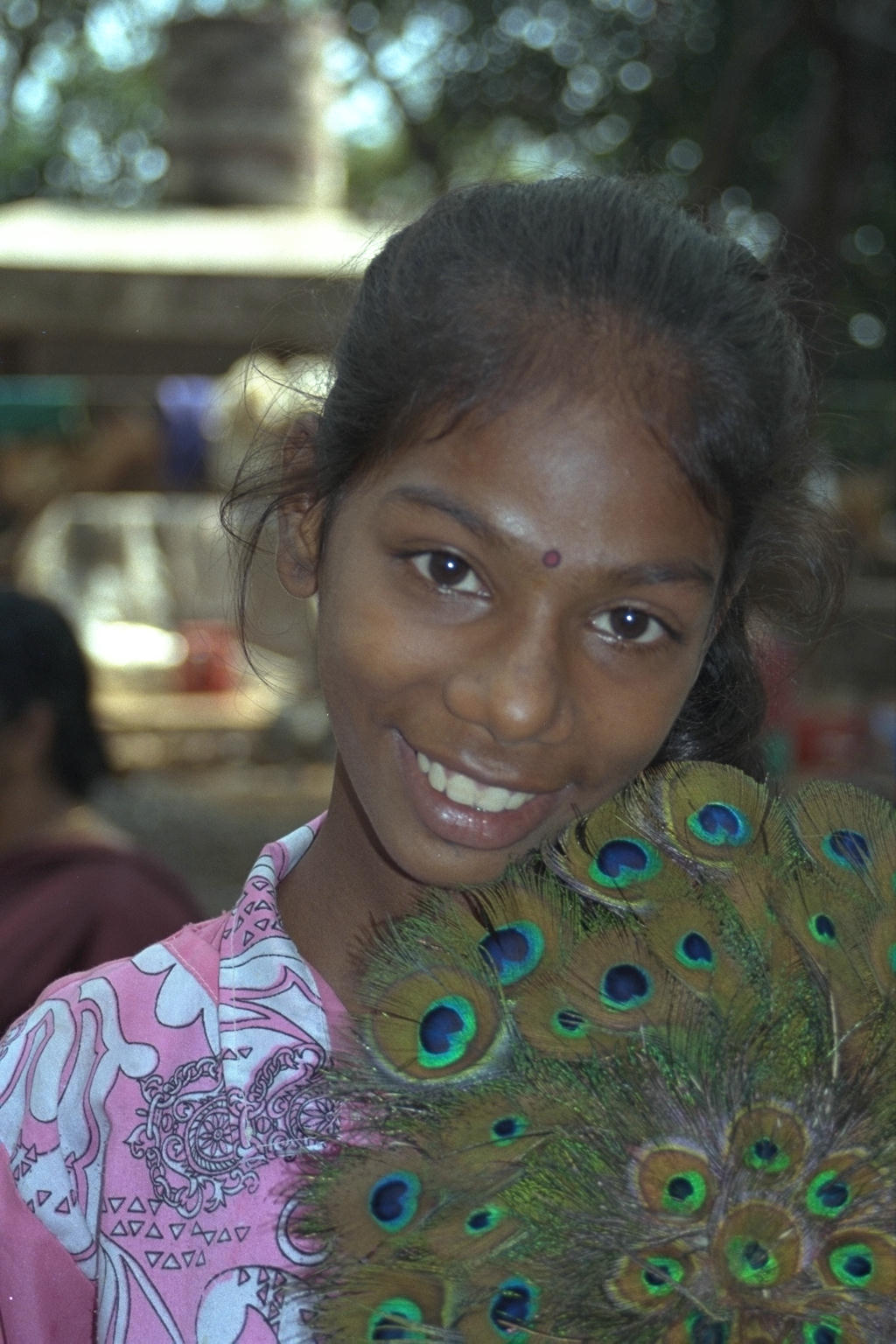
I immediately have to think of the twelve year old Channu from Mumbai: never been to school, but she does speak English while selling these fans for 25 cents each. I found it a waste for such an intelligent child to not have the opportunity for school just because her cradle was in a wrong place.
In return, Bill requests a letter. Each month again. No letter - no money. He is very strict about this, and the parents will only make the mistake of forgetting to write a letter once. This looks very similar to the Foster Parents Plan, with one difference. There is no overhead, all the money paid goes to the children. The trips and accomodations are low cost, and aren't funded from the donations he receives. Recently there was a newspaper article, and this brought in about 6000 dollar. But that was one-off, it isn't sufficient to expand his initiative. We brainstorm a bit about methods to obtain money, and I leave Bill with the promise of getting back on this.
I've sent off an email to the Telegraaf . The story: this newspaper publishes my travel articles, but doesn't pay me. Instead they have to include a small bit with Bill's story and a bank account number. In a later stage his bookkeeping will be published (Bill keeps a maticulate account of his cash flow) and I can translate the stories the children have sent Bill, and forward them to the newspaper.
Bill sent me an email when I was in Mae Hong Son. He tells me he is currently working in a school near the border with Laos - the area Martin and I have crossed. He gives me a description of the village, and tells me it will probably not be on my map. But I have an excellent map, and from Chiang Mai it is just a journey of half a day. There is no time to tell him I'm coming; I take a gamble and go to see him.
In the early afternoon I arrive in the small village. My pocket dictionary doesn't have an entry for 'school', and there isn't anyone speaking anything else than Thai. In the end I decide to cruise all the streets, and I locate the school. The teachers don't know any Mr. Hall, but they do understand I'm looking for a farang called Bill. Bill's 'daughter' is fetched. They explain to me where Bill lives. There is a brand new house in the village - Bill's house, a Thai woman and two children. Bill isn't home - he has gone to Chiang Khong to arrange a visum for Laos. He is expected back at 4 PM. I make a big loop through the Thai countryside and return at 4. Bill still hasn't arrived, probably returning on the 5 PM bus. I ride into the jungle, and make a smaller loop along the Laos border.
When I return, he still isn't there. They ask me to wait inside. Bill is very surprised to see me in his living room. The large TV with sattelite dish is turned down, and we talk about his work at this school. I feel his work is very limited, he doesn't like to talk about the children in other countries. I try to steer the conversation in that direction three times before giving up. I ask him to send me some information about the children in other countries, and one or more of his travel reports. I tell him about my message to the newspaper, and that I haven't received a reply yet. We eat the meal the lady of the house has prepared, and I leave Bill at 9 PM. I await the messages from Bill and the Telegraaf before drawing any conclusions.
The first tropical island
Meanwhile Menno has planned his holiday: he expects to arrive February 11th at Phuket. I can stay in Thailand until February 3 - I haven't left Thailand yet (to Laos, Vietnam or Cambodia). I can get an extension to my visum for 8 days, but that isn't enough. So I have to leave the country, and then return to get a new stamp which is valid for another 30 days. Maleisia is for me the only possibility, I have to leave thailand with bike and all. For now I have 2 weeks - there is no rush.
I want to go to the sea - since Goa, India, I haven't been in the salt water. After my visit to Bill I start off in southerly direction. It almost seems like the Thai are investing all the money earned in their golden age (until 1997) in road construction. From Chiang Kman until Nan ( some 4 hours long) I ride on brand new roads.
Again I'm in mountain terrain, but now the vegetation is different. This is not a rough forrest, this is replanted. It doesn't measure up to the jungles I've already seen: the hills are planted with just three different kinds of trees. Other hills are barren all together - just some species of grass make them look green. In the past the removal of forrest was done on a large scale. And now this is causing problems: erosion and shortage of water. That's why they try to put new forrests in place, but the road back is long and tedious. And the weather isn't helping either: the wet season wasn't wet enough last year. And now, during the dry season, it sometimes rains, but not enough to fill the reservoirs. Northern Thailand is suffering drought. The second harvest of rice for this year has been forbidden in many places - this accounts for the many dried-up rice fields I see.
After a long time of new roads and roughly the same scenery I attempt another spot of GPS navigation. After two hours I'm off the map, and I have no idea where I am. The signs along the roads have no decipherable text for me, the people don't understand me. I follow the now unpaved roads, and hope for the best in these "sensitive border areas" on my map. This is a good map, but only now I discover the longitude and latitude lines are missing. Just when I need them the most! After a considerable time of uncertainty I bump into a city that is on my map. I am in Sali. To leave from here I have to cross one of those contested areas. But turning around is not something I prefer either - I hate having to ride the same road twice.
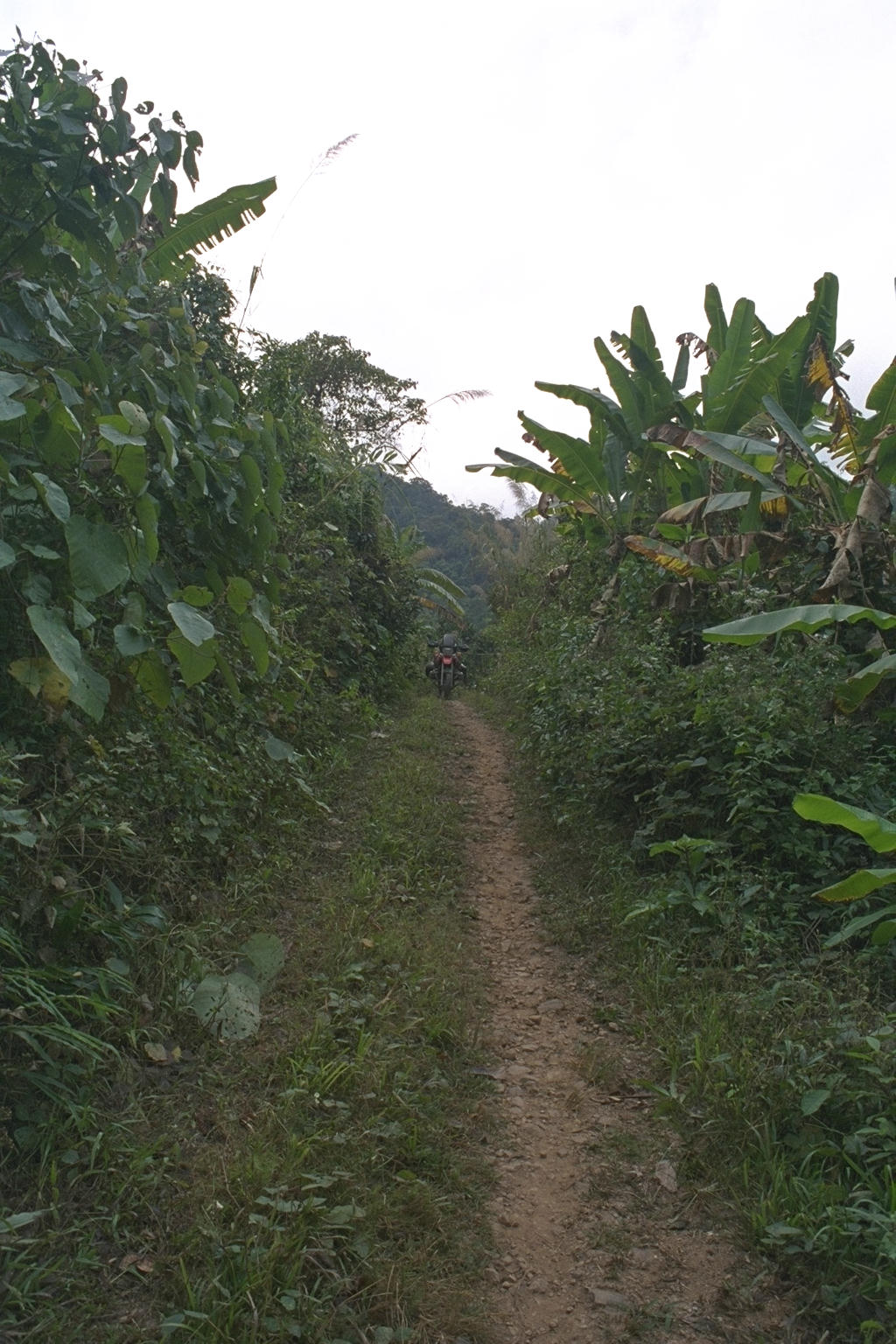
And this is just as well, for I'm now so far away from the inhabited world the lumberjacks haven't arrived here. Again I'm treated to a trip through the green mass. The unpaved road is very accessible, and I'm having a great time! Only thing is I should have bought some gas in Sali, my tank is getting empty in a hurry, and I still have a good deal of miles to go. Just when I think about putting the gas from my burner in the tank I spot a 'gas station': two oil drums, one with diesel, the other with petrol, with a hand pump on top. I buy 5 liter, and the servant doesn't believe my Tank can hold that much gas. If only he knew...
The hills slowly make way for some flat terrain` right after I have returned to asphalt roads. And it gets hot, very hot. I measure a driving wind temperature of 37 degrees Celsius - I choose through roads to be assured of enough wind. The scenery now gets really boring. This is the area where they grow sugar canes. And nothing else. The only interruption in the scenery are the factories processing the sugar canes. The cooking of the stuff creates an unpleasant odor. The quality of the trucks transporting the sugar canes also diminishes. And with that the attention for the traffic rules. So there is some truth in the stories about Indian driving methods in Thailand.
Suddenly there is a crowd of people. I've noticed a lot of people walking and driving on the road carrying jerry cans for the last few miles. The crowd has gathered around a crashed tank truck. The truck went down in the left ditch, the trailer in the right one. From both vehicles petrol is pouring out, the people try to fill their jerry cans with the stuff. The smell of gas is strong - I don't see any police officers or firemen. A moped pulls up next to me - the chauffeur has a burning cigarette between his teeth. Time to move on quickly...
The goal for this second day is called Ko Chang, and I reach that island in the afternoon. A ferry takes me across the water, and soon I have found the perfect sleeping place: a (partly) straw cabin under the palm trees on the beach. The travel guide photographer hasn't discovered this place: this is how things were before it was added to the Holland International travel guide. The palm trees grow right up to the edge of the beach, the sand is white as snow. In the bay where I ended up are some beach houses and two restaurants. Very primitive and very private. The next morning I take a walk and don't see anyone for two hours. These places draw a special kind of people, traveling ahead of the masses. Many Germans come here for 'abschalten': away from the stress, and bask in the endlessness of the soothing waves breaking on the snowwhite beaches.
The only dive joint on this island has problems with the boat: the rudder has broken off, and they need new parts from the mainland. There will be no diving today or tomorrow. I spend my time answering email all morning, and in the afternoon a relaxing nap. And yet this isn't perfect: I miss Carolyn. After two times Bonaire with her she has become an integral part of my tropical islands experiences. After one day I've seen enough. Tuesday January 26 I exchange Koh Chang for Pattaya.
(The rest will be in part two of journal #17)
Adriaan.